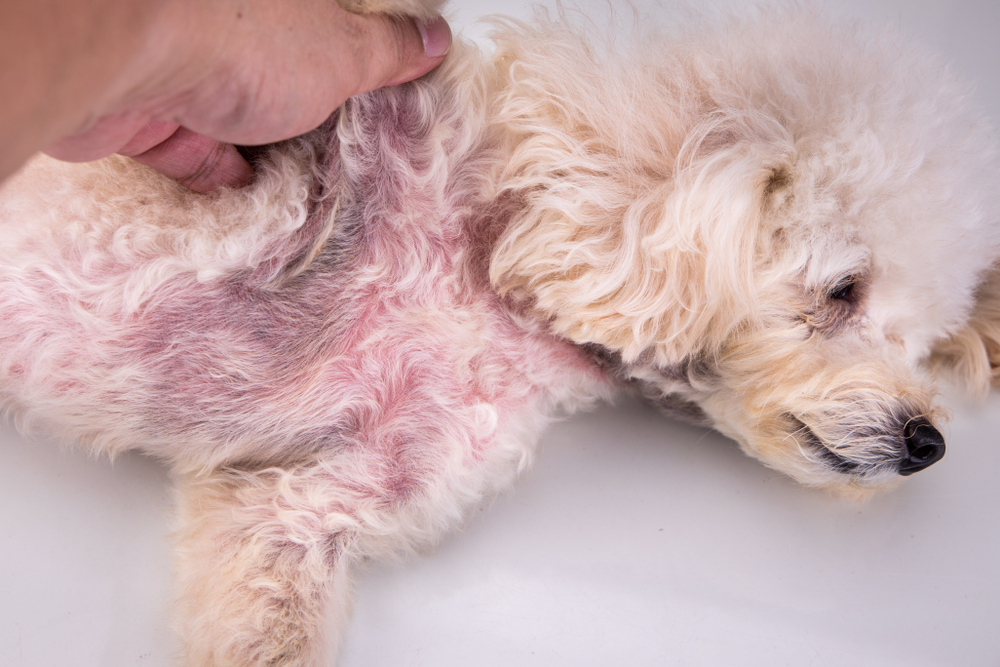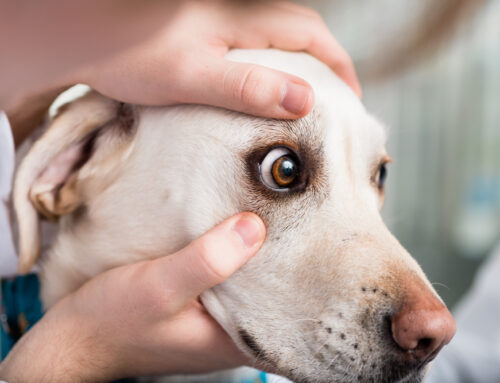Skin conditions in pets are common and can be caused by various things, including allergies, flea and tick infestations, skin infections, hot spots, and skin cancer. These conditions can lead to discomfort, itching, and pain for your pet, and ultimately affect their overall health and happiness. Because skin conditions in pets are so common, it’s important to recognize the signs and seek veterinary care to ensure proper treatment. At Southern Arizona Veterinary Specialty and Emergency Center, we frequently see pets with skin problems, and we share some of the most common issues we encounter and how you can help your pet.
While skin problems in pets tend to occur more often when the weather warms up, they can happen anytime. By understanding these conditions and their root causes, you can help your pet get diagnosed and receive treatment before the problem becomes severe.
Allergies in pets
Several types of allergies can affect pets, including food allergies, environmental allergies, and flea allergies. The signs of an allergic reaction can vary depending on the type of allergy and the severity of the reaction but can include itching, redness, swelling, and skin irritation. Treatment options include identifying and removing the allergen from the pet’s environment, prescribing medications such as antihistamines and steroids, and using immunotherapy to desensitize the pet’s immune system.
Fleas and ticks in pets
Flea bites can be annoying to pets, but they can also cause significant skin irritation, especially in dogs and cats allergic to flea saliva protein. Even one flea bite in these pets can trigger flea allergy dermatitis, or FAD. Affected pets are intensely itchy, especially at the tail base, and experience redness, inflammation, hair loss, and open sores. Secondary bacterial infections and yeast infections are common side effects. Treatment includes strict parasite prevention and controlling fleas in your home by laundering your pet’s bedding, vacuuming, and mopping.
Skin infections in pets
If skin conditions are left untreated, bacteria or fungi can cause secondary skin infections in pets. Common signs include redness, irritation, and itching. Treatment options may include topical or oral antibiotics, antifungal medications, and medicated shampoos. It is essential to seek veterinary care if you suspect your pet has a skin infection to prevent it from becoming more severe.
Hot spots
Hot spots, also known as acute moist dermatitis, are a common skin condition in pets. These appear as red, moist, and painful patches on the skin and can be caused by various things, such as allergies, fleas, and poor grooming. Common signs of hot spots include itching, licking, and biting at the affected area. Treatment options include clipping the hair around the sore, cleaning the area with an antiseptic solution, and administering topical or oral medications to relieve itching and inflammation.
Skin cancer

Like people, pets can develop skin cancer. The cancer can take various forms, such as squamous cell carcinoma, malignant melanoma, and hemangiosarcoma, and may be caused by genetics, sun exposure, or other factors. Signs of skin cancer include the development of lumps or bumps on the skin, sores that do not heal, and abnormal growths. Treatment options may include surgical removal of the tumor, radiation therapy, or chemotherapy. Early detection and treatment of skin cancer can significantly improve your pet’s prognosis and quality of life.
Skin conditions in pets can be caused by various things, including allergies, flea and tick infestations, skin infections, hot spots, and skin cancer. It’s essential to recognize the signs of these skin conditions and seek veterinary care to ensure proper treatment. By understanding common skin conditions and their root causes, pet owners can take preventive measures to keep their pets healthy and happy. At Southern Arizona Veterinary Specialty and Emergency Center, our team of experts is dedicated to providing the best possible care for pets with skin conditions. We encourage pet owners to schedule regular checkups with their veterinarian to ensure their pets’ overall health and well-being.








Leave A Comment